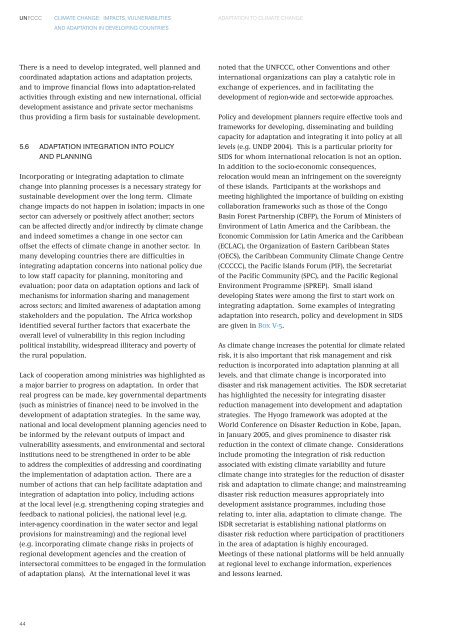impacts
Create successful ePaper yourself
Turn your PDF publications into a flip-book with our unique Google optimized e-Paper software.
UNFCCC<br />
CLIMATE CHANGE: IMPACTS, VULNERABILITIES<br />
AND ADAPTATION IN DEVELOPING COUNTRIES<br />
ADAPTATION TO CLIMATE CHANGE<br />
There is a need to develop integrated, well planned and<br />
coordinated adaptation actions and adaptation projects,<br />
and to improve financial flows into adaptation-related<br />
activities through existing and new international, official<br />
development assistance and private sector mechanisms<br />
thus providing a firm basis for sustainable development.<br />
5.6 ADAPTATION INTEGRATION INTO POLICY<br />
AND PLANNING<br />
Incorporating or integrating adaptation to climate<br />
change into planning processes is a necessary strategy for<br />
sustainable development over the long term. Climate<br />
change <strong>impacts</strong> do not happen in isolation; <strong>impacts</strong> in one<br />
sector can adversely or positively affect another; sectors<br />
can be affected directly and/or indirectly by climate change<br />
and indeed sometimes a change in one sector can<br />
offset the effects of climate change in another sector. In<br />
many developing countries there are difficulties in<br />
integrating adaptation concerns into national policy due<br />
to low staff capacity for planning, monitoring and<br />
evaluation; poor data on adaptation options and lack of<br />
mechanisms for information sharing and management<br />
across sectors; and limited awareness of adaptation among<br />
stakeholders and the population. The Africa workshop<br />
identified several further factors that exacerbate the<br />
overall level of vulnerability in this region including<br />
political instability, widespread illiteracy and poverty of<br />
the rural population.<br />
Lack of cooperation among ministries was highlighted as<br />
a major barrier to progress on adaptation. In order that<br />
real progress can be made, key governmental departments<br />
(such as ministries of finance) need to be involved in the<br />
development of adaptation strategies. In the same way,<br />
national and local development planning agencies need to<br />
be informed by the relevant outputs of impact and<br />
vulnerability assessments, and environmental and sectoral<br />
institutions need to be strengthened in order to be able<br />
to address the complexities of addressing and coordinating<br />
the implementation of adaptation action. There are a<br />
number of actions that can help facilitate adaptation and<br />
integration of adaptation into policy, including actions<br />
at the local level (e.g. strengthening coping strategies and<br />
feedback to national policies), the national level (e.g.<br />
inter-agency coordination in the water sector and legal<br />
provisions for mainstreaming) and the regional level<br />
(e.g. incorporating climate change risks in projects of<br />
regional development agencies and the creation of<br />
intersectoral committees to be engaged in the formulation<br />
of adaptation plans). At the international level it was<br />
noted that the UNFCCC, other Conventions and other<br />
international organizations can play a catalytic role in<br />
exchange of experiences, and in facilitating the<br />
development of region-wide and sector-wide approaches.<br />
Policy and development planners require effective tools and<br />
frameworks for developing, disseminating and building<br />
capacity for adaptation and integrating it into policy at all<br />
levels (e.g. UNDP 2004). This is a particular priority for<br />
SIDS for whom international relocation is not an option.<br />
In addition to the socio-economic consequences,<br />
relocation would mean an infringement on the sovereignty<br />
of these islands. Participants at the workshops and<br />
meeting highlighted the importance of building on existing<br />
collaboration frameworks such as those of the Congo<br />
Basin Forest Partnership (CBFP), the Forum of Ministers of<br />
Environment of Latin America and the Caribbean, the<br />
Economic Commission for Latin America and the Caribbean<br />
(ECLAC), the Organization of Eastern Caribbean States<br />
(OECS), the Caribbean Community Climate Change Centre<br />
(CCCCC), the Pacific Islands Forum (PIF), the Secretariat<br />
of the Pacific Community (SPC), and the Pacific Regional<br />
Environment Programme (SPREP). Small island<br />
developing States were among the first to start work on<br />
integrating adaptation. Some examples of integrating<br />
adaptation into research, policy and development in SIDS<br />
are given in Box V-5.<br />
As climate change increases the potential for climate related<br />
risk, it is also important that risk management and risk<br />
reduction is incorporated into adaptation planning at all<br />
levels, and that climate change is incorporated into<br />
disaster and risk management activities. The ISDR secretariat<br />
has highlighted the necessity for integrating disaster<br />
reduction management into development and adaptation<br />
strategies. The Hyogo framework was adopted at the<br />
World Conference on Disaster Reduction in Kobe, Japan,<br />
in January 2005, and gives prominence to disaster risk<br />
reduction in the context of climate change. Considerations<br />
include promoting the integration of risk reduction<br />
associated with existing climate variability and future<br />
climate change into strategies for the reduction of disaster<br />
risk and adaptation to climate change; and mainstreaming<br />
disaster risk reduction measures appropriately into<br />
development assistance programmes, including those<br />
relating to, inter alia, adaptation to climate change. The<br />
ISDR secretariat is establishing national platforms on<br />
disaster risk reduction where participation of practitioners<br />
in the area of adaptation is highly encouraged.<br />
Meetings of these national platforms will be held annually<br />
at regional level to exchange information, experiences<br />
and lessons learned.<br />
44


